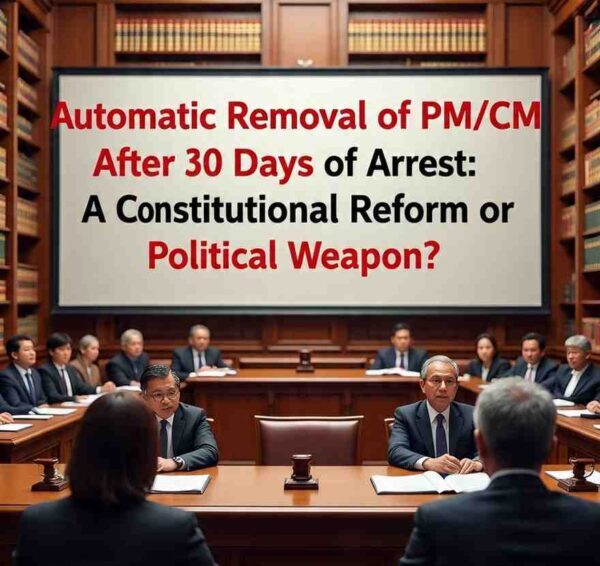Automatic removal of PM and CM after 30 days in jail—India’s new 130th Constitutional Amendment Bill raises sharp debate. Reform or political vendetta? Find out the key highlights.
Introduction
The 130th Constitutional Amendment Bill, 2025, introduced in Parliament by Union Home Minister Amit Shah on 20 August 2025, has ignited one of the fiercest debates in recent Indian political history. The Bill proposes that the Prime Minister, Chief Ministers, and other ministers will automatically lose their positions if they remain under arrest for 30 consecutive days on charges punishable by five years or more. What makes this law particularly contentious is that no conviction is required—mere arrest, extended beyond 30 days, is enough to trigger removal.
While supporters hail it as a step toward cleansing politics of corruption and criminality, the opposition has branded it “draconian”, warning that it could be misused as a political weapon to destabilize governments and silence dissent.
This article explores the constitutional, democratic, and political implications of this bold reform.
The Key Provisions of the Bill
The 130th Constitutional Amendment Bill, 2025, aims to establish a uniform framework governing all elected executive office holders, both at the central and state levels. Its main provisions include:
Automatic Disqualification
Any Prime Minister, Chief Minister, or Union/State Minister will be removed from office if under arrest for 30 consecutive days on charges that carry a minimum punishment of five years imprisonment.
No Conviction Necessary
Unlike current provisions under the Representation of the People Act, 1951, which require conviction by a court for disqualification, this Bill treats prolonged arrest itself as sufficient ground for removal.
Scope of Application
Applies to both preventive detention and judicial custody, provided the period crosses 30 consecutive days.
Reinstatement Possibility
If acquitted or granted bail later, the individual may contest again or return to political life, but not reclaim the removed post automatically.
Supporters’ Perspective: Cleaning Politics
Supporters argue that the Bill is a necessary correction to India’s governance system, which the criminalization of politics. Key arguments in favor include:
- Preventing Governance Paralysis:
A Prime Minister or Chief Minister in prolonged custody cannot effectively discharge duties. Automatic removal ensures governance is not stalled. - Curtailing Criminal Influence:
Nearly 40% of MPs in the 2019 Lok Sabha had declared criminal cases, including serious charges. This amendment could serve as a deterrent against fielding candidates with tainted backgrounds. - Global Comparisons:
Many democracies impose strict standards on public office holders. For instance, in the UK and Canada, MPs convicted and sentenced to prison face immediate disqualification. This law, supporters argue, adapts those safeguards to Indian conditions.
Critics’ Perspective: A “Draconian” Tool
The opposition has strongly criticized the amendment, calling it a blow to democratic principles. Their objections include:
- Erosion of “Innocent Until Proven Guilty”:
The Bill overturns the core principle of criminal jurisprudence by treating arrest as equivalent to guilt, even without trial or conviction. - Political Misuse by Ruling Parties:
With investigative agencies often accused of targeting opposition leaders, critics fear that governments could orchestrate arrests to topple rivals. For example, a Chief Minister under arrest in a politically sensitive case could be removed even before charges are proven. - Threat to Federalism:
States governed by opposition parties are particularly vulnerable. Automatic removal of Chief Ministers could allow the Centre to destabilize non-aligned state governments. - Judicial Overload & Prolonged Custody:
India’s criminal justice system is slow. An accused may remain in custody for long periods due to delays, meaning political careers could be cut short unfairly.
Constitutional & Democratic Implications
Balance of Power
By expanding the grounds for automatic removal, the amendment could tilt the balance of power toward the ruling party at the Centre, weakening checks and balances in a federal system.
Judicial Independence & Due Process
If removal is triggered by arrest, without conviction, the judiciary’s role in determining guilt is effectively bypassed. This sets a dangerous precedent.
Potential for Selective Enforcement
Investigating agencies like the ED, CBI, and NIA—already accused of political bias—gain disproportionate influence, raising concerns about the selective application of the law.
Political Fallout
The introduction of this Bill has already sparked nationwide protests by opposition parties, who allege it is aimed at ousting non-BJP leaders currently facing legal cases. Some see it as an attempt to consolidate power ahead of upcoming state elections and the 2029 general elections.
Civil society groups, legal scholars, and former judges have also weighed in. While some welcome the attempt to reduce criminalization of politics, most caution against the dangers of political vendetta under the guise of legal reform.
Way Forward: Balancing Accountability & Rights
While the goal of decriminalizing politics is laudable, any law that weakens due process and the presumption of innocence risks undermining democracy itself. A more balanced approach could involve:
- Fast-Track Courts for cases involving elected representatives, ensuring verdicts within a fixed timeframe.
- Independent Oversight Mechanisms to prevent misuse of investigative agencies.
- Conditional Suspension Instead of Automatic Removal, where ministers may step aside temporarily but regain office if acquitted.
Conclusion
The 130th Constitutional Amendment Bill, 2025, sits at the intersection of reform and repression. On one hand, it promises to clean up politics by ensuring that leaders facing serious criminal charges cannot continue in power while under arrest. On the other hand, its broad provisions risk being weaponized against political opponents, weakening democratic safeguards and federalism.
Whether this Bill emerges as a milestone in India’s journey toward transparent governance or a tool of authoritarian control will depend not just on its implementation, but on the strength of India’s institutions to safeguard democracy.

























